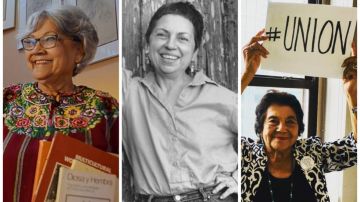10 Chicana Activists Who Fought for Equal Rights in the Chicano Movement
Cesar Chavez

Photo:Instagram/@thepi.nkfactory/@weexist.ttc/@doloreshuerta
Cesar Chavez. Rodolfo “Corky” Gonzales. Reies Tijerina. We recognize these names as leaders of the Chicano Movement of the 1960s and ’70s. But what about the women who were instrumental in fighting for equal rights for Chicanos and Latinos? Like practically every other important movement in history, women’s names, stories, and contributions are often overshadowed by those of their male counterparts.
In fact, Chicanas found that they were being discriminated against and not being heard in their own communities, so a Chicana Movement/Chicana Feminism arose in and of itself. We want to highlight these Mexican-American women who not only held it down so that the men could make moves for justice, but also did more than their fair share to see that equality for Chicanos and Latinos wasn’t just a wish, but a reality.
Helen Chavez
“Behind every great man, is a great woman.” This was definitely the case with Cesar Chavez, and his wife, Helen. The Chicana and the Mexican- American civil rights leader married in 1948 and went on to have eight children and 31 grandchildren and 16 great-grandchildren. Helen Chavez also was involved in her husband’s cause fighting for the rights of migrant farm workers. She volunteered at the Community Service Organization (CSO), taught literacy classes for migrant workers and helped them get their U.S. citizenship, served as a bookkeeper for the National Farmworkers Association and head of its credit union, and was a part of demonstrations. All of this in addition to working up to 10 hours to support her family.
wp_*posts
Dolores Huerta
Dolores Huerta is the most well-known name in Chicanx activism fighting for the rights of migrant farm workers. The labor leader was on the front line of major changes and at the helm of the inception of new, now legendary organizations. Huerta co-founded the Stockton chapter of the Community Service Organization (CSO) in 1955, and in 1962, with Cesar Chavez, she co-founded the National Farm Workers Association (NFWA), which became the United Farm Workers’ Union (UFW). Huerta also helped to organize the famous Delano Grape Strike of 1965, and served as the lead negotiator of the contract that resulted from this fight.
wp_*posts
Gloria Arellanes
Gloria Arellanes worked with the Neighborhood Adult Participation Project, was the Minister of Finance and Correspondence of the Chicano Brown Berets (at their founding East L.A. chapter, where she also edited their La Causa newspaper), served as the administrator at the El Barrio Free Clinic, and was also a member of the National Chicano Moratorium Committee. In addition to all this, Arellanes also co-founded the Chicana civil rights organization La Adelitas de Atzlan.
wp_*posts
Francisca Flores
Activist, feminist, and editor Francisca Flores learned about about the Mexican Revolution from female veterans she lived with while confined to the Vauclain TB (tuberculosis) Sanitorium. This inspired her to create Hermanas de la Revolucion, a group where women could talk freely about politics. From there, Francisca Flores joined the Sleepy Lagoon Defense Committee, helped found the Mexican American Political Association (MAPA), co-founded the Comision Feminil Mexicana Nacional, and edited the feminist magazine Regeneracion.
wp_*posts
Enriqueta Vasquez
Enriqueta Vasquez made her mark first when she worked at the U.S. Attorney’s Office in Denver, as the first Chicano in the Justice Department. She made it a point to assign judges that would be fair and sympathetic to Chicanxs on trial. Enriqueta then started organizing with the GI Forum, became assistant director of SER (Service, Employment, and Redevelopment), and helped Rodolfo “Corky” Gonzales run for mayor of Denver. She was one of only two women who stood up against the Rocky Mountain News, picketing after a racist article against Chicanos was published. Vasquez also served as a co-founder and writer for El Grito del Norte, ran the Vincent Ranch, and founded the organization Hembras de Colores.
wp_*posts
Martha Cotera
Martha Cotera is a writer, librarian, and activist, Cortera wrote Diosa y Hembra: The History and Heritage of Chicanas in the U.S., and The Chicana Feminist. She also became involved with the Political Association of Spanish Speaking Organizations (PASSO), worked with the farm workers movement, co-formed Texans for Educational Advancement for Mexican Americans (TEAMS), helped found Jacinto Trevino College, co-founded Mujeres por La Raza Unida, co-founded the Texas Women’s Political Caucus, and founded the non-profit Chicana Research and Learning Center.
wp_*posts
Anna Nieto-Gómez
Anna Nieto-Gómez is another prominent face in the struggle for Chicanx equality. In 1971, the educator and activist founded the group and newspaper Hijas de Cuauhtémoc while as a student at CSU Long Beach. She was also voted the first female president of the Movimiento Estudantil Chicano de Aztlan (MEChA), was involved in the first United Mexican Students organization (UMAS), and went on to teach Chicano Studies courses at CSU Northridge.
wp_*posts
Judithe Hernández
https://www.instagram.com/p/BYTa1w8jrhg/
Art and activism has always gone hand in hand. Bold visuals depict injustices happening in the barrios, heroes helping to create change, and the hope that keeps us going. Judithe Hernandez, who became part of the Chicano Movement, is a notable artist who was a founding member of the Chicano Art/L.A. Mural Movements. In 1974, she became the only woman, and fifth member of the Chicano artist collective Los Four. Judithe also collaborated with El Teatro Campesino, advocated for the United Farm Workers, and was a member of the Concilio de Arte Popular (CAP), all with fellow Los Four member, friend, and collaborator Carlos Almaraz.
wp_*posts
Elizabeth Martinez
Activist, organizer, feminist, educator, and author Elizabeth “Betita” Martinez is another notable name in the Chicano/Chicana Movements. She has written several works, including 500 Years of Chicano History in Pictures and De Colores Means All of Us: Latina Views for a Multi-Colored Century. Martinez also worked for the United States Secretariat researching colonization and decolonization in Africa, served with the Student Nonviolent Coordinating Committee (SNCC; one of only two Latinas), and co-founded a newspaper to support the Alianza Federal de Mercedes called El Grito Del Norte. The list goes on, she also co-founded and directed the Chicano Communications Center and taught Ethnic Studies and Women’s Studies at Hayward State.
wp_*posts
Gloria Anzaldúa
Gloria Anzaldúa was a Chicana poet, author, and activist, who used words to convey her experience as a LGBTQ woman growing up on the Mexico/Texas border in her most famous work, Borderlands/La Frontera: The New Mestiza. Her visibility made others feel visible and represented during a time when that was extremely rare in literature. Anzaldúa also tackles themes including border culture, Chicanx culture, feminism, mestizaje, queer theory, and spirituality.

















